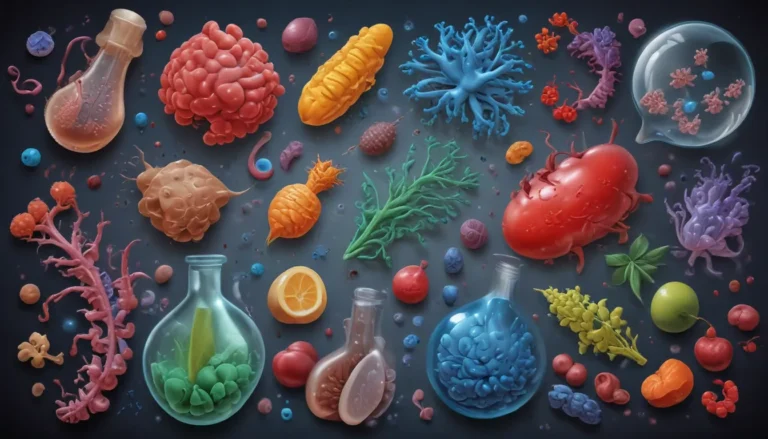A Note About Images: The images used in our articles are for illustration purposes only and may not exactly match the content. They are meant to engage readers, but the text should be relied upon for accurate information.
Welcome to the captivating world of polymer chemistry, where macromolecules shape our daily lives and revolutionize industries. In this article, we will explore 14 intriguing facts about polymer chemistry, shedding light on the diverse applications and unique properties of polymers. From drug delivery systems to 3D printing, polymer chemistry drives innovation and transforms the way we interact with the world around us.
Polymers: The Building Blocks of Modern Life
Polymers are everywhere in our daily lives, from plastic bottles to synthetic fibers in our clothes. These large molecules, composed of repeating subunits called monomers, have become an integral part of our modern world, offering unique properties and versatility.
The Evolution of Materials Science through Polymers
The discovery of polymers revolutionized materials science by providing a means to synthesize customized materials with unique properties. Prior to this breakthrough, materials were primarily derived from natural sources, limiting the possibilities for innovation and development.
Enhancing Drug Delivery Systems with Polymers
Polymers play a crucial role in designing drug delivery systems that can target specific cells or tissues, improving the efficacy and safety of medications. This application of polymer chemistry has transformed the field of pharmaceuticals and advanced the treatment options available to patients.
Tailoring Properties Through Molecular Structure
Scientists can alter the arrangement and composition of monomers to create polymers with a wide range of properties, including flexibility, rigidity, elasticity, and conductivity. This versatility allows for the customization of materials to suit specific applications and industries.
Pioneering Sustainable Materials with Polymer Chemistry
With a growing emphasis on sustainability, polymer chemists are actively researching and developing biodegradable and renewable polymers as alternatives to traditional petroleum-based plastics. This focus on eco-friendly materials is essential for addressing environmental challenges and promoting a more sustainable future.
DNA: Nature’s Own Polymer
Deoxyribonucleic acid (DNA), the blueprint of life, is a natural polymer composed of nucleotide monomers. Polymer chemistry plays a vital role in understanding the structure and function of DNA, offering insights into genetic information and biological processes.
Driving Innovation in 3D Printing with Polymers
3D printing relies on polymers to create intricate structures layer by layer, revolutionizing manufacturing processes and enabling the production of complex and customizable objects. Polymer chemistry has played a significant role in advancing this technology and expanding its applications across various industries.
Electrifying Advancements in Electronics with Conductive Polymers
Conductive polymers have revolutionized the field of electronics by offering electrical conductivity and flexibility. These polymers are instrumental in creating flexible displays, organic solar cells, and electronic sensors, paving the way for transformative innovations in the electronics industry.
Protective Coatings and Strong Bonds: The Role of Polymers in Modern Industry
Polymers are essential components in coatings and adhesives, providing protection, durability, and bonding properties in various industrial applications. From paints to super glues, polymers play a critical role in enhancing product performance and extending the lifespan of materials.
Advancing Medical Technology with Biocompatible Polymers
Polymers, such as biocompatible and biodegradable materials, are instrumental in the development of medical implants, including artificial joints, stents, and tissue scaffolds. These advanced materials offer improved patient outcomes and contribute to the development of innovative healthcare solutions.
Adaptable Smart Materials: Shaping the Future with Polymer Chemistry
Smart materials, capable of changing their properties in response to external stimuli, rely on polymer chemistry for their development. These materials have diverse applications in aerospace, robotics, and biomedicine, demonstrating the versatility and potential of polymer-based technologies.
Unveiling the Mysteries of Biological Systems with Polymer Chemistry
Biopolymers, such as proteins and carbohydrates, play crucial roles in biological processes. Polymer chemistry techniques enable scientists to study the structures, interactions, and functions of these complex biological systems, offering valuable insights into the mechanisms of life.
Environmental Stewardship through Polymer-Based Remediation
Polymers are utilized in various environmental remediation techniques to remove pollutants from water or soil, addressing environmental challenges and protecting ecosystems. These polymer-based solutions offer sustainable and effective ways to mitigate pollution and promote environmental health.
The Ever-Evolving Field of Polymer Chemistry
Polymer chemistry continues to be a dynamic and exciting field of research, with ongoing advancements in synthesis, characterization techniques, and applications. Researchers and innovators in the field are dedicated to pushing the boundaries of knowledge and driving innovation across diverse industries.
Conclusion: Embracing the Promise of Polymer Chemistry
In conclusion, polymer chemistry is a fascinating field that encompasses the study of macromolecules and their diverse applications. From the discovery of synthetic polymers to the design of advanced materials, polymer chemistry holds immense promise for a sustainable and technologically advanced future. By exploring the intricacies of polymer chemistry, scientists and engineers can create materials that revolutionize our daily lives and shape the world around us.
FAQs: Exploring Key Aspects of Polymer Chemistry
-
What are polymers and why are they significant in chemistry?
Polymers are long chains of repeating chemical units known as monomers. They are significant in chemistry due to their unique properties that make them essential in various applications, such as plastics, fibers, and adhesives. -
What is polymerization?
Polymerization is the process by which small monomers react together to form long chain polymers. It can occur through addition polymerization, where monomers join without the loss of atoms, or condensation polymerization, which involves the elimination of small molecules during the process. -
Can polymers be biodegradable?
Yes, certain polymers can be engineered to be biodegradable, breaking down over time into harmless byproducts under specific environmental conditions. This design helps reduce the environmental impact of polymer materials. -
What are the different types of polymers?
Common types of polymers include thermoplastics, which can be melted and re-molded, and thermosetting polymers, which become rigid and heat-resistant through a chemical reaction during curing. -
How is polymer chemistry used in everyday life?
Polymer chemistry has diverse applications in everyday life, including the production of plastic containers, clothing fibers, coatings for electronics, drug delivery systems, and many other essential products.
These FAQs offer a concise overview of key aspects of polymer chemistry, providing a foundation for further exploration and understanding of this fascinating field. Whether you are a curious learner or an aspiring chemist, the world of polymer chemistry invites you to discover its wonders and possibilities.






